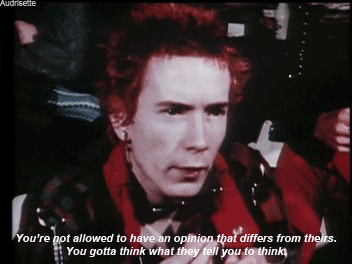ϟ
A Reflection on Pop Culture – The Place of Punk
Originating in the late 1960s, punk was a subculture defined by its counter-cultural dissidence, political outspokenness and anti-materialism. The movement rejected many of the decade’s dominant ideologies, and actively sought to defy the mainstream popular culture of the time, which it regarded as ‘a crisis of meanings caused by the commodification of everyday life’ (Moore 2004, p.311). Despite this, seventies punk iconography has retrospectively become a prominent part of the decade’s popular culture, as the movement’s valuable societal influence has been recognised, along with its commercial viability within the current capitalist landscape. Punk imagery has been ‘co-opted over the years into wider consumerist frameworks’ (Sabin 1999, p.225), distilled into an aesthetic version fit for widespread public consumption. Ironically, punk iconography has been popularised within a modern context through the very means which disassociated it from the dominant culture of its time.
The changing place of punk within popular culture exemplifies the notion that popular culture artefacts and practices are variable, not historically fixed (Storey 2008, p.15); yet, while individual artefacts and practices may change status as popular culture, a general framework is in place to identify this cultural subset. Within a popular culture context, ‘culture’ is broadly defined as a group’s particular way of life, and as practices and texts created as sites wherein meaning can be derived (Williams 1988, p.90). The word ‘popular’ holds four distinct definitions: something that is widely favoured, work created to win favour (a decidedly commercial definition), culture made by the people for themselves, and inferior types of work (Williams 1988, p.237). Popular culture itself exists as the complex interplay of these individual definitions (Williams 1988, p.237).
This conception of popular culture carries with it particular implications surrounding its function as a social, political and economic force. Many popular culture scholars posit that ‘culture is collective by definition,’ therefore, culture has a social purpose to identify one as a member of a group (Takacs, 2015, p.3). An extension of this asserts that the ‘people’ inferred by the term popular culture include many diverse social groups, united through their distinction from the economic, political and cultural elite (Storey 2008, p.12). Popular culture consequently becomes a definitively political terrain, whilst furthermore demanding accessibility for the masses. Interactions between cultural texts and ‘the people’ thereby embody present social climates (Takacs 2015, p.9).
Popular culture emerged following industrialisation and urbanisation, thus, a further aspect of the concept that must be addressed is its commercial qualities (Storey 2008, p.13). As ‘people do not spontaneously produce culture from raw materials of their own making… what is certain is that its raw materials are those which are commercially provided’ (Storey 2008, p.10). Contingent upon a commercialist, capitalist society, this definition inherently links popular culture to marketability, and commerce.
Punk conforms to the popular culture guidelines of political motivation and social collaboration, with a set of determining artefacts; however, lacks commerciality and popularity. As a relatively localised movement, punk was not a part of dominant culture. In recent years however, punk iconography has been repositioned and adopted into mainstream popular culture; popularised through its visuals as opposed to motivations, making superficial aspects of punk accessible to and popular within the modern mainstream, thereby creating a commercially viable product and allowing it to be reframed historically as a prominent part of 1970s popular culture.
 Reference List
Reference List
Moore, R 2004, Postmodernism and Punk Subculture: Cultures of Authenticity and Deconstruction, Taylor & Francis Inc., New York, USA.
Rhodes, Carl & Westwood, Robert 2008, Critical Representations of Work and Organisation in Popular Culture, Routledge, New York, USA.
Sabin, Roger 1999, Punk Rock: So What? The Cultural Legacy of Punk, Routledge, London, UK.
Segal, Emma 2012, Punk Britannia, Not Just a Label, viewed 19 March 2016,
<https://www.notjustalabel.com/editorial/punk-britannia>
Storey, J 2008, Cultural Theory and Popular Culture: An Introduction, Pearson/Prentice Hall, London, UK.
Takacs, Stacy 2015, Interrogating Popular Culture: Key Questions, Routledge, New York, USA.
Williams, Raymond 1988, Keywords: A Vocabulary of Culture and Society, Fontana Press, London, UK.
